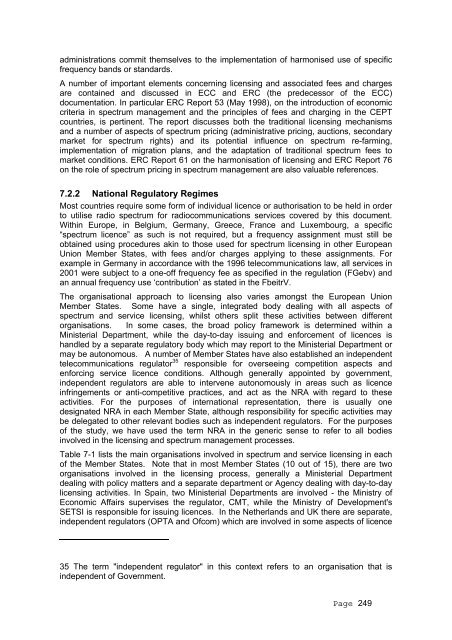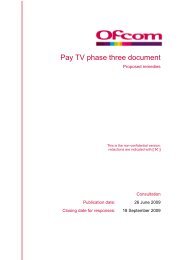FINAL REPORT - Stakeholders - Ofcom
FINAL REPORT - Stakeholders - Ofcom
FINAL REPORT - Stakeholders - Ofcom
Create successful ePaper yourself
Turn your PDF publications into a flip-book with our unique Google optimized e-Paper software.
administrations commit themselves to the implementation of harmonised use of specific<br />
frequency bands or standards.<br />
A number of important elements concerning licensing and associated fees and charges<br />
are contained and discussed in ECC and ERC (the predecessor of the ECC)<br />
documentation. In particular ERC Report 53 (May 1998), on the introduction of economic<br />
criteria in spectrum management and the principles of fees and charging in the CEPT<br />
countries, is pertinent. The report discusses both the traditional licensing mechanisms<br />
and a number of aspects of spectrum pricing (administrative pricing, auctions, secondary<br />
market for spectrum rights) and its potential influence on spectrum re-farming,<br />
implementation of migration plans, and the adaptation of traditional spectrum fees to<br />
market conditions. ERC Report 61 on the harmonisation of licensing and ERC Report 76<br />
on the role of spectrum pricing in spectrum management are also valuable references.<br />
7.2.2 National Regulatory Regimes<br />
Most countries require some form of individual licence or authorisation to be held in order<br />
to utilise radio spectrum for radiocommunications services covered by this document.<br />
Within Europe, in Belgium, Germany, Greece, France and Luxembourg, a specific<br />
“spectrum licence” as such is not required, but a frequency assignment must still be<br />
obtained using procedures akin to those used for spectrum licensing in other European<br />
Union Member States, with fees and/or charges applying to these assignments. For<br />
example in Germany in accordance with the 1996 telecommunications law, all services in<br />
2001 were subject to a one-off frequency fee as specified in the regulation (FGebv) and<br />
an annual frequency use ‘contribution’ as stated in the FbeitrV.<br />
The organisational approach to licensing also varies amongst the European Union<br />
Member States. Some have a single, integrated body dealing with all aspects of<br />
spectrum and service licensing, whilst others split these activities between different<br />
organisations. In some cases, the broad policy framework is determined within a<br />
Ministerial Department, while the day-to-day issuing and enforcement of licences is<br />
handled by a separate regulatory body which may report to the Ministerial Department or<br />
may be autonomous. A number of Member States have also established an independent<br />
telecommunications regulator 35 responsible for overseeing competition aspects and<br />
enforcing service licence conditions. Although generally appointed by government,<br />
independent regulators are able to intervene autonomously in areas such as licence<br />
infringements or anti-competitive practices, and act as the NRA with regard to these<br />
activities. For the purposes of international representation, there is usually one<br />
designated NRA in each Member State, although responsibility for specific activities may<br />
be delegated to other relevant bodies such as independent regulators. For the purposes<br />
of the study, we have used the term NRA in the generic sense to refer to all bodies<br />
involved in the licensing and spectrum management processes.<br />
Table 7-1 lists the main organisations involved in spectrum and service licensing in each<br />
of the Member States. Note that in most Member States (10 out of 15), there are two<br />
organisations involved in the licensing process, generally a Ministerial Department<br />
dealing with policy matters and a separate department or Agency dealing with day-to-day<br />
licensing activities. In Spain, two Ministerial Departments are involved - the Ministry of<br />
Economic Affairs supervises the regulator, CMT, while the Ministry of Development's<br />
SETSI is responsible for issuing licences. In the Netherlands and UK there are separate,<br />
independent regulators (OPTA and <strong>Ofcom</strong>) which are involved in some aspects of licence<br />
35 The term "independent regulator" in this context refers to an organisation that is<br />
independent of Government.<br />
Page 249
















